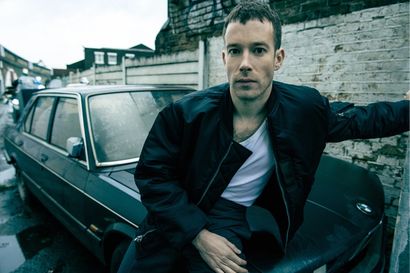Financier and environmentalist Ben Goldsmith: “Psychedelic experiences are life’s cheat codes”
When Goldsmith’s daughter, Iris, died in an accident on the family farm, it was like he had been “living his life in a spacesuit, and suddenly the spacesuit was ripped off.” In the months and years that followed, he sought answers in organised religion, psychic mediums – and a hallucinogenic trip that upended the way he looked at the world…
Not so long ago, at his house in Somerset, environmentalist and financier Ben Goldsmith sat down in front of his laptop, poured himself a whisky and attempted to write about the most horrendous day of his life: 8 July, 2019. That was the day his 15-year-old daughter, Iris, died in a freak accident involving an all-terrain vehicle at the family home. The resulting chapter, which forms the opening of his book, God is an Octopus, is a completely remarkable piece of writing – absolutely raw and open and devastating. I started reading the first page of it between emails, standing up at my desk, and realised, 30 minutes later, that I hadn’t sat down or looked up. It makes you want to ring up everyone you’ve ever loved and tell them so.
It’s the details that get you – the tiny moments of ordinariness earlier in the day, in the hours and minutes “before the sky fell”. Like the German-style gnocchi Goldsmith’s two young children eat for lunch; the size of the lens of the photographer friend he chats to in the last bit of small talk before the shattering call; the way his son, Isaac, hums merrily into his bowl of pasta as they celebrate his performance during a cricket match that afternoon. Each small moment – the moments that make up all of our lives, really – is unbearably freighted with portent and poignancy. And then comes the nightmare of nightmares, the wave of sheer disbelief, the out-of-body terror, and the policeman on the driveway, who appears to Goldsmith, in that moment, to be standing at the far end of a long tunnel: “Are you Mr Benjamin Goldsmith?” On the morning of the accident, Iris said that she’d seen a ghost in her bedroom the night before – a young girl.
In early March, sitting in Goldsmith’s living room in Primrose Hill, London, on a big, soft sofa mostly occupied by a large, friendly lurcher called Tarka, I ask Goldsmith what it was like to revisit that day in writing. “I found it really, really hard to think of,” he says, sitting opposite me in chinos, slippers and a navy jumper – its gently frayed sleeve revealing at various moments the name ‘Iris’ tattooed simply on his wrist. “I still find it very hard to think about. You know, a sort of PTSD kind of experience. But just ordering thoughts about something so big was helpful in itself. When you go through something really big, your mind goes all over the place, and you think really big thoughts and ask really big questions. Just finding a way to order those is cathartic.”
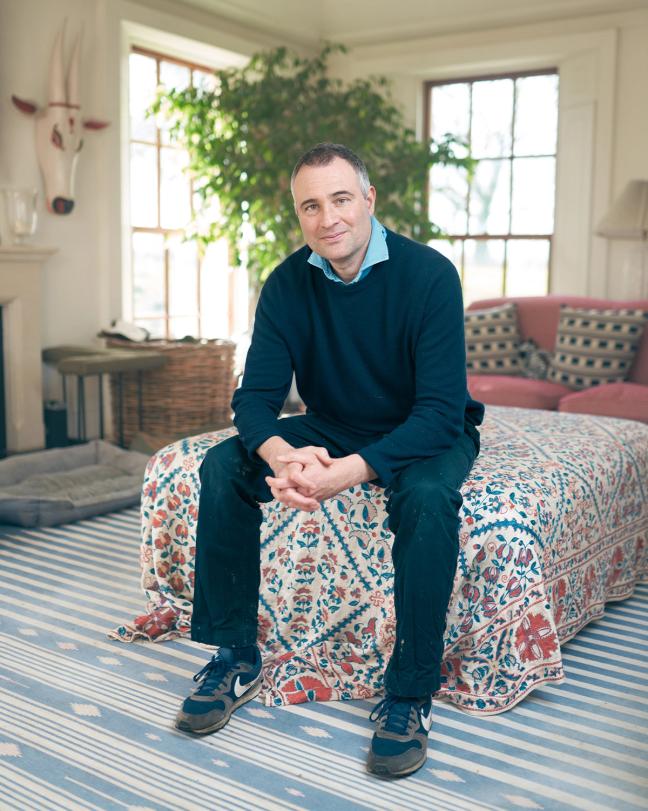
The search for catharsis – a search for meaning, whatever that means – is the elusive thread that runs through the book, and probably through the past five years of Goldsmith’s life. In the wake of the tragedy, he visited a parish vicar, a buddhist temple, a rabbi, a spiritual medium and a grief counsellor, among others. He had not been particularly religious growing up. He remembers seeing a science teacher at school kneeling down to pray and regarding him almost with pity. How could a man of logic fall for the big man in the sky?
“My father [Jimmy Goldsmith] would have thought of himself as Jewish, but in fact was christened and confirmed a Catholic. My mother [Lady Annabel Goldsmith] was pretty traditional Church-of-England English, but we only went to church for weddings and christenings, and I wasn’t really religious at all.” If anything, he says, he vaguely disdained religion, which he felt tried to take credit for the “beautiful, magical nature all around us” via some invisible man.
“Then the bomb goes off in your life and you lose someone incredibly close. Especially the wrong way round – a child rather than a parent. You’re immediately left searching for some kind of ongoing trace because it’s very appealing, the idea that they might still be around.” Goldsmith’s descriptions of the wreckage of that explosion, so to speak, are heart-wrenching. He recalls that Joan Didion wrote about how grief, it turns out, is very much like fear. He writes about how “a crushing dread followed me night and day, permeating my dreams, my mind, and every cell of my body.” In the days after the accident, as Cannwood, the family farm, became a sort of “grief kibbutz”, full of friends and family, he writes that he felt like a barrel, “filling inexorably with rainwater beneath a storm gutter.” When he sensed that the barrel was about to overflow, he would “hide around corners and in bathrooms... crying until my chest ached and my tears ran dry.”
“I felt as if the world I had known was somehow cracked open, and something extraordinary beyond had been revealed to me”
“Curled up on the bathroom floor or lying foetal on the bed,” he writes, at one point, “I found myself crying out loud, pleading with Iris for a sign. What I craved more than anything else was to know that her experience continued, that it wasn’t all over for eternity, an unending nothingness.” In the days after Iris’s death, her mother, Kate Rothschild, sat with her body in the morgue beneath the hospital. Rothschild told Goldsmith that she was certain she could hear Iris’s voice speaking to her. “Please, mummy, stay here with me.”
“You do have a feeling that is hard to describe in words because it’s so different from everything you’ve perceived with your ordinary senses,” Goldsmith says. “And that’s a feeling of closeness with the one that’s gone, or a feeling of closeness to something ineffable. That’s hard to dismiss. And it may be the grasping for some ongoing trace that we all feel when we lose someone. But then I had a handful of experiences that just made me think: my god, what have I missed?”
The first and perhaps most significant of these took place in a suburban living room in a terraced house in Fulham, London. Goldsmith was meeting a woman called Eleanor. He’d been pointed in her direction by a friend who had also lost a child. Eleanor was a spiritual medium, and the pair sat in armchairs in the quiet of her house on a rainy afternoon, an array of crystals spread between them. Eleanor placed a crystal in each of her hands, shut her eyes, and began immediately to speak.
“There’s a girl,” Eleanor said. “My, she’s a strong character, and she’s been very eager to contact you. She wants you to know that she’s sorry. I presume she is your daughter?” Goldsmith hadn’t told the medium about the accident, and guessed that she might have read about it in the papers. But the details that followed – a tennis match he and Iris had meant to play; a breakfast he often cooked; a specific pink book of messages from Iris’s schoolfriends; a recent dream he’d had about dancing with Iris – could not have been known about by almost anyone except Goldsmith. It completely floored him. “I went out into the early evening drizzle,” he writes. “I felt as if the world I had known was somehow cracked open, and something extraordinary beyond had been revealed to me.”
“I would never try to persuade anyone that it was real,”Goldsmith tells me. “But in that moment, in that room, I experienced what was, to me, a conversation with my daughter. It was just... all the hairs on the back of my neck stood up at the things she said. It was the conversation we would have had, had Iris been sitting in front of me.”
Goldsmith did not undergo some grand spiritual conversion. But he did find himself open to new experiences; to new ideas about the way life and death and the world might work. “Do I feel religious? No. But I feel that we’re part of a mystery that is really beyond our understanding,” he says. He points out that this sense of mystery extends into the world of science as well, where disciplines such as quantum physics indicate to us not how much we understand, but how very little. Following the death of his friend and collaborator, Michele Besso, Albert Einstein wrote in a letter to Besso’s family: “Now he has departed from this strange world a little ahead of me. That means nothing. People like us, who believe in physics, know that the distinction between past, present and future is only a stubbornly persistent illusion.”
“I do find myself dwelling in a way that I wouldn’t have previously on these metaphysical meanderings,” Goldsmith says. “I walk my kids to school, and I do find myself wondering: is time just an illusion? Is there any separation between here and there, wherever Iris is now? Is there any separation between then and now?” He has two sons – Frank and Isaac – with Rothschild (the couple divorced in 2013), and five children with his wife, Jemima Jones: Eliza, Arlo, Vita, Vincent, and Paloma, who was born in April this year.
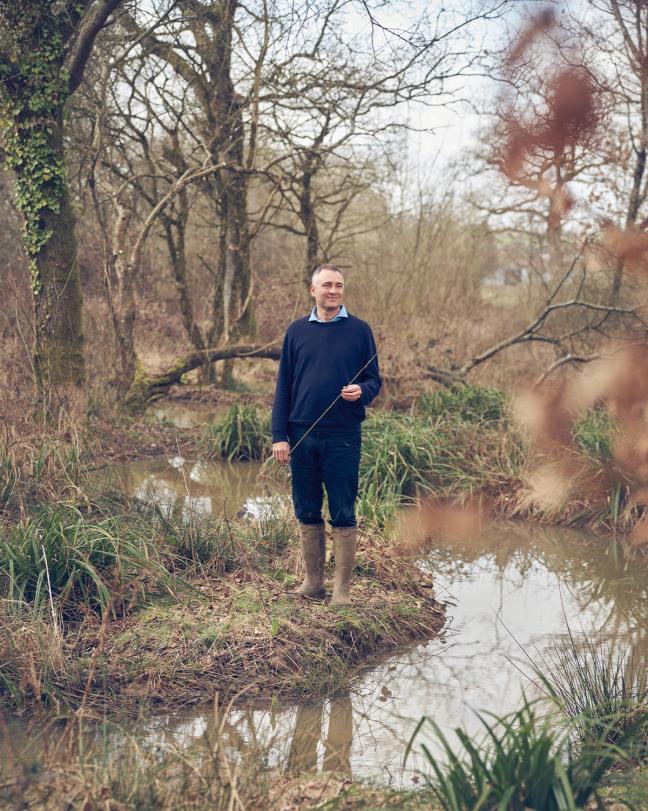
In as much as Goldsmith found any religion, he found it in nature – the thing that he had always loved and felt connected to, especially as a child. In the hours after Iris’s funeral, Goldsmith swam in the wild pond at Cannwood, “bathed in birdsong and the late afternoon sun.” He was, he writes, “dimly aware somewhere of a sense of relief. It dawned on me that I was alive still to the beauty of nature, here, now, on this of all days.”
“I think one of the closest ways we can get in touch with the ineffable is through nature,” he says. “And I think that’s why it felt so important to me at the time of my grief to be in nature, to go swimming in a pond, to be outside.” He points to studies about how hospital patients recover more quickly if they can see nature through their ward window; how prisoners are less likely to reoffend if they’re allowed a few hours each week to tend vegetables or plants.
“We just love being in nature, and I think that even those who would never say it would pay twice the price for an apartment that overlooks a park,” he says. “These things are more important to us than we know how to describe. And tiny fragments of the connection are revealed to us with each passing year.”
Goldsmith is often buoyant and beaming, and becomes filled with a genuinely childlike enthusiasm when he starts talking about nature, and in particular about beavers. I have just searched the word ‘beaver’ in my transcript, in fact, and it comes up 32 times. Goldsmith’s day-to-day job is managing his investment firm Menhaden Capital, named after a type of foraging fish sometimes described as the most important in the sea. “My real work is building an investment management company and making great returns – risk-adjusted, of course,” he says with a playful smile. “But I think, since Iris died, and since sitting down to write this book, I’ve realised that the purpose of my life is much more likely to be in working with nature.” He describes his job in finance as like playing backgammon with friends. He enjoys it, it’s stimulating, he likes the challenge and the competition, he likes it when he wins, and he thinks he’s pretty good at it. “But, for me, the soul food is in something like plotting the reintroduction of beavers to Greece, which is going to happen in two weeks, by the way...”
This, he admits, is his favourite topic. “I’ve always found it fascinating that if we took an orphaned baby beaver from birth, and raised it in our house on carrots, like a little pet dog, and then we took it at a year and a half or two years old and put it in the river, it would build a dam of unbelievable complexity that we could never even dream of doing. Give us all the sticks and all the mud and all the stones – we’d never be able to hold that water back.”
Beavers, he explains, are the ‘keystone’ species that once held many habitats across the world together. Their tiny dams, threaded through water systems across the continents, help slow the passage of water from the mountaintop to the sea, preventing flash flooding, creating natural reservoirs and birthing new environments for other species of plants and animals to thrive. They are some curiously, accidentally benevolent creatures – enthusiastically plying away at their own little projects, and slowly but steadily influencing the rest of the world around them as they do so. I point out that maybe Goldsmith is a beaver in some way, or that the beaver is his spirit animal, whatever that means. When he talks about his various projects, there’s an eagerness, a cheekiness, a warmth in his face that somehow reminds me of a lovable cartoon rodent. “I’m the beaver guy, yes!” he laughs. “I think it’s just that I’ve developed a very powerful motivation to bring beavers back to every river system from which we’ve extracted them. But I’m also obsessed with wild boar, and I love the idea that we can get lynx back into Britain, too. And I think one day, we’ll have wolves back. I just love the completeness of ecosystems when they work.”
“Since Iris died, and since sitting down to write this book, I’ve realised that the purpose of my life is much more likely to be in working with nature”
Goldsmith is perhaps best known now for his work in rewilding. On the morning after we meet he’ll be heading to Cannwood to meet a group of other landowners keen to return their estates to nature in some way. In the epilogue to the book, he describes how “several more neighbours have chosen to adopt our approach” and how “an inkblot of wildness” is expanding slowly out from the memorial stone circle the family built to Iris. “I’ve joined the assorted ranks of writers, thinkers, campaigners and conservationists who are campaigning for a return to a former vibrancy and abundance of nature in Britain,” he writes. “And I’m relentless in my efforts among them.”
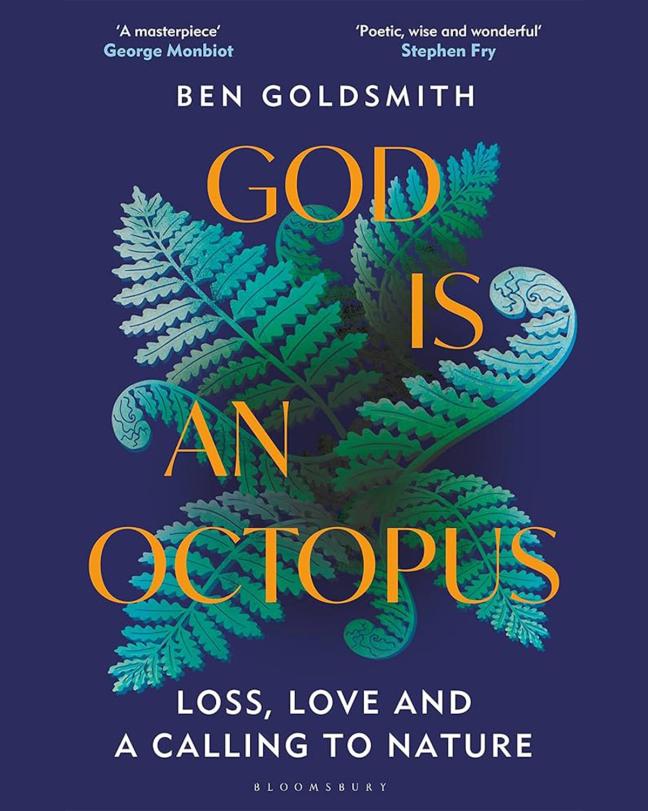
At one point in the book, Goldsmith writes about the “wood wide web” – a phrase coined by scientists to describe the “great mycorrhizal fungal networks in the earth, through which whole communities of trees and other plants are seen to disseminate information, including via electric pulses.” At another, he describes how trees that have had their leaves chewed by giraffes release compounds into the air, warning the other trees in the forest so that they can release a bitter-tasting chemical into their own leaves and those of all their neighbours. The world, Goldsmith reminds us, from the beaver to the fungi, is wholly interconnected and in constant communication. It is one system, essentially, comprising millions of systems. Everything is everything else.
This idea seems to fit directly on top of another big concept in the book, and in Goldsmith’s life, as well. Ideas of oneness, of interconnectedness, of the links between the infinitely small and the unimaginably huge are a constant trope of psychedelic experiences, too, I point out. In the final act of the book, Goldsmith’s search for a connection with Iris takes him to a hallucinogenic ritual under the influence of ayahuasca, the potent psychoactive brew made from a particular South American vine. He’d tried the drug before in Ecuador in his early twenties, and remembers mostly vomiting in panic for an entire night, and feeling simply relieved to be alive afterwards.
This time, having read up on the process voraciously, Goldsmith travelled to a specialist retreat in England – he doesn’t say where – for a two-night ceremony, accompanied by his cousin, Tristan. He packed his cricket whites, reasoning he’d need some comfortable, loose-fitting clothes. On the first night, lying on a mattress in a room with six other initiates and several guides, he describes finding himself in “an echoey place” where giant, brightly coloured amoebas drifted all about him. He heard his own voice. “Iris, are you here?” he seemed to say. “Can you believe it? I’ve come to the ends of the world to find you.”
He didn’t see Iris directly that night. Instead, he writes about how “waves of knowing began to wash through me, relentlessly, overwhelmingly... I was overcome with the understanding that, one way or another, all will be well; a great benevolence envelopes us, comprising all things imagined and real.” He came back into the room reciting the words “I understand, I understand, I understand” again and again.
There was a sense, he recalls, that all the religious or spiritual people he’d ever met – all the people throughout history, in fact, who believed in something bigger than themselves – had known something that he had allowed himself to be blind to all his life. “They knew. They all knew.”
On the second night, Goldsmith’s experience was even richer and more profound. In a remarkable passage in the book, he describes how he experienced a “beautiful collage” of all of his life with Iris in it. “I saw a tiny baby gazing with sky-blue eyes up at a 23-year-old me, awestruck, smitten; I saw her temper, her strength, her compassion, her profound goodness.” He saw a montage of their private jokes, their little glances across the table; Iris’s ability to wind him up, and her buttoning up her uniform on the first day at school. “As she shone before me, I was overwhelmed by waves of perfect, joyous remembering,” he writes. “I realised Iris had never been mine; she had never belonged to anyone.” Later, Goldsmith saw everyone he knew and loved – his children, his siblings, his mother, Rothschild, Jones – and saw “each one doing their best to be good”. He “ached with pride and love for each of these... engulfed by wave after wave of love and gratitude”. He saw himself as an old man on a gnarled path, the sky above him smeared with peach-coloured clouds, and knew, somehow, that he “had travelled alongside these people across the aeons.” As he emerged sobbing, he asked for a piece of paper and scrawled down the words “God is an octopus” – a single sentence amid a sea of hearts and names.
Back in Primrose Hill, stimulated by nothing more than a decent cup of tea, Goldsmith reaches for an analogy to explain psychedelic experiences like this: “I think it’s some sort of cheat code, in a way.” One interpretation, he says, is that it is a sort of trap door that we can quickly drop through to reach “a deeper kind of archetypal, inherited self ” that’s always present, and in which “there is tremendous creativity and wisdom and love, and other things to be found.” The second explanation, he says, is that this deeper self may well be “in connection with the divine” in a simple and profound way. “When you see a bed of mushrooms in the forest, you think that they’re all different, individual organisms,” he says. “But in fact, there may be just one organism that has a load of different mushroom heads that come up from it. I think maybe that is the nature of consciousness: that maybe that deeper self for me is the same as it is for you. The deeper you go, the less individual it is, to the point where eventually there is just a single glowing consciousness.”
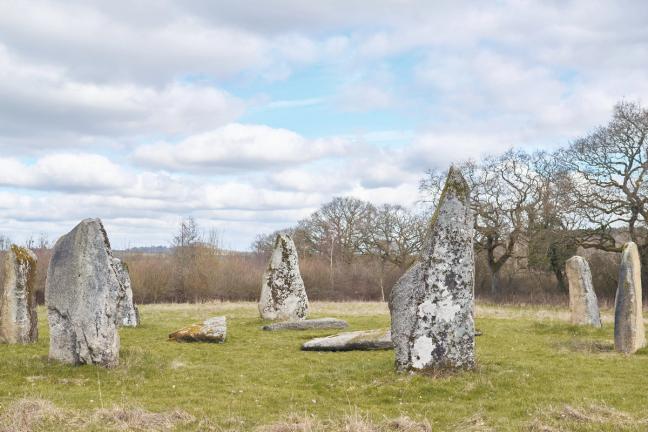
“Wood wide web” – a phrase coined by scientists to describe the “great mycorrhizal fungal networks in the earth, through which whole communities of trees and other plants are seen to disseminate information, including via electric pulses.”
Either way, he says, “I don’t think it really matters which interpretation you have. Because I think we know it works. The data shows that for all kinds of situations – from bereavement to depression to addiction to PTSD, even to the loss of creativity in writers – a single psychedelic experience can be utterly transformational. We don’t really know why. But it was transformational for me.”
I ask Goldsmith how the experiences of the past few years have changed how he feels about his own mortality. “I’m still scared of death,” he says. “But the fear of death, for me, revolves around young children growing up without a father. So for myself, I’m not scared.” In fact, he says, he’s “fascinated by the idea of what death entails. Because I think there’s a reasonable chance that it does feel like we are awakening from some kind of a dream, that we kind of wake up laughing: ‘Oh, I can’t believe we were afraid of this, and here I am, back in the actual reality...’”
How does he feel about his own dreams, in that case? “Mostly, I don’t remember them. When I do, they often don’t feel consequential. I think, occasionally, there’s a big dream that has some kind of meaning, and I would try to understand it a little bit in a way that I would never have done before.”
Does he dream about Iris often? “Not often enough. I dream about Iris very rarely. That’s pure bliss when I do, and it’s a rare thing. I dream about my father in a way I didn’t used to. Occasionally, I have interactions with my father that are meaningful. He was 63 when he died, and I was 16.”
And how does he look at the waking world now? How has he changed personally, in the day-to-day texture of life, from five years ago? “I’m definitely more patient than I was, and less likely to judge people and get angry,” he says. “I think that’s partly just ageing as well. But that doesn’t mean I don’t get pangs of irritation. People walking slowly, looking at their mobile phone on the pavement – I want to get round them like everyone else. But I now wonder to what extent people are as responsible for their actions as we think they are. I think, maybe, there is this deeper self, this conditioning, that we don’t quite understand. It arises from a huge smorgasbord of causation, some of which may stretch far beyond our own individuality, even our own lifetime.”
At one point, Goldsmith describes the event of Iris’s death as “like floating around in a spacesuit in space, and then the spacesuit is just ripped off. Suddenly, you get to see everything differently.” There is not a moment when he does not wish things were different. “But the event, the thing that we didn’t ask for, the thing that we had no choice in, has presented to us these kinds of gifts,” he says. “I think I have a much greater appreciation of each day. I have greater highs of joy. I grab at it with both hands whenever I feel joy.” The busy, full house gurgles with children below us, and Tarka snoozes contentedly on the sofa. “I feel everything much more deeply than I used to. Deep grief does come with some of these gifts,” he says. “The things we didn’t ask for, but have to accept.”
This feature was taken from our Spring 2024 issue. Read more about it here.
Want more long reads? Check out our feature on Miami, perhaps the most important city in the Americas right now…

Become a Gentleman’s Journal Member?
Like the Gentleman’s Journal? Why not join the Clubhouse, a special kind of private club where members receive offers and experiences from hand-picked, premium brands. You will also receive invites to exclusive events, the quarterly print magazine delivered directly to your door and your own membership card.
